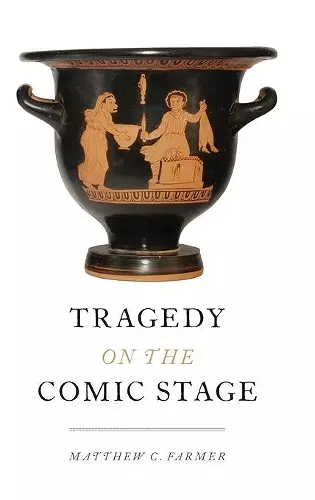Tragedy on the Comic Stage
Format:Hardback
Publisher:Oxford University Press Inc
Published:29th Dec '16
Currently unavailable, and unfortunately no date known when it will be back

Aristophanes' engagement with tragedy is one of the most striking features of his comedies: Euripides appears repeatedly as a character in these plays, jokes about tragedy and tragic poets abound, and parodies of tragedy frequently underlie whole scenes and even the plots of these plays. Tragedy on the Comic Stage contextualizes this engagement with tragedy within Greek comedy as a genre by examining paratragedy in the fragments of Aristophanes' contemporaries and successors in the fifth and fourth centuries. Farmer organizes these fragments under two rubrics. First, he discusses fragments that show characters discussing tragedy, use tragic poets as characters, or make reference to the dramatic festivals; these fragments, Farmer argues, develop a "culture of tragedy" within Greek comedy, a consistent set of tropes and devices that depict tragedy as part of the world inhabited by the characters of these plays. Second, he assembles fragments that show tragic parody, imitations of tragedy that render tragic language humorous or ironic by juxtaposing it with the base characters and quotidian circumstances that make up Greek comedy. Tragedy on the Comic Stage then illustrates these features of fragmentary paratragedy within three intact Aristophanic comedies: Wasps, Women at the Thesmophoria, and Wealth. These new readings of Aristophanes' plays show the value of reading Aristophanes in conjunction with the comic fragments, and insist on the subtlety and complexity of Aristophanic paratragedy.
Farmer makes a convincing case for reading Aristophanes alongside the fragments of contemporary plays and for the importance of paratragedy in old and middle comedy. Anyone interested in Greek drama will enjoy and benefit from this book. ... Summing Up: Recommended. Lower-division undergraduates through faculty. * M. J. Johnson, CHOICE *
Farmer thus offers many valuable insights, but also many interpretations whose appreciation would require a literary culture almost as deep as Aristophanes own, if not considerably deeper. * Alan H. Sommerstein, Phoenix71 (2017) *
Despite the difficulties posed by a crowded field and difficult source materials, Matthew C. Farmer has written a book about comedy, and comic fragments in particular, which is not only witty but important ... The material he gathers is rich and exhilarating. We get "a sort of backstage view of the tragic competition, with tragedians, fans, and audience members arguing about their favourite poets, planning their next productions, and complaining about the state of tragic poets today". We hear complaints about weak plots and crazy producers: "why didn't he give Sophocles a chorus when he asked for one, but employed the son of Cleomachus instead, a man I would not rate worthy of a chorus even for the Adonia" (an inferior festival specifically for women). We discover that certain playwrights were a right pain when rehearsing the chorus, while others were firm favourites. "I am consumed with longing for Euripides!" * Barbara Graziosi, Times Literary Supplement *
Farmer's study is a welcome addition to our understanding of the way Aristophanes and other comic playwrights engaged with Greek tragedy ... This is really a book about trugoidia, comedy that emphasizes "the agonistic relationship between comedy and tragedy". We might call it "comedy with an attitude." ... There are, to my mind, no missteps in Tragedy on the Comic Stage. Farmer is respectful of the evidence, especially of the fragments, yet imaginative in teasing out ideas ... I found [the] book to be clearly written and free of jargon, with appropriate sign-posting; the arguments flow smoothly ... Tragedy on the Comic Stage is more than a synthesis; it offers a systematic new perspective on how the two genres interacted. * Kenneth S. Rothwell, Bryn Mawr Classical Review *
ISBN: 9780190492076
Dimensions: 157mm x 236mm x 31mm
Weight: 567g
282 pages